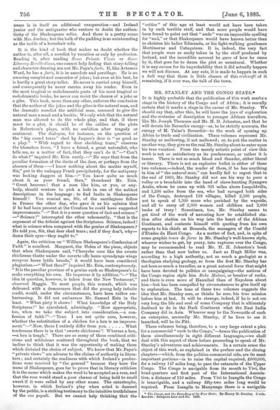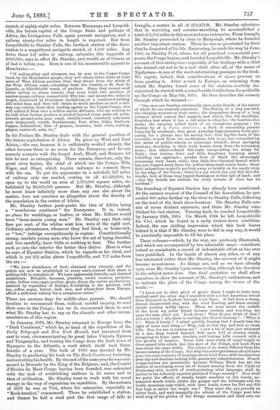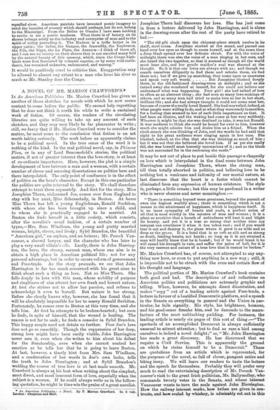MR. STANLEY AND THE CONGO STATE.*
IT is highly probable that the publication of this work marks a stage in the history of the Congo and of Africa ; it is morally certain that it marks a stage in the career of Mr. Stanley. We should say that, after this, he will leave the joys of exploration and the ecstasies of description to younger African travellers, like Mr. Joseph Thomson and Mr. H. H. Johnston, and that he will devote his Berserkir energy—or, to be strictly accurate, the energy of M. Taine's Berserk-jr—to the work of opening up Africa to trade and civilisation. These volumes represent Mr. Stanley as mellowing, if not mellowed ; or, to put the matter in another way, they give us the real Mr. Stanley about to enter upon his true vocation. From the merely artistic point of view this work is not so satisfactory as its predecessors, or rather it is tamer. There is not so much blood and thunder, either literal or literary. There is not an explosive bullet in either of these two volumes,—indeed, the reader of them, if he has anything in him of" the natural man," can hardly fail to regret that in the end of 1883, Mr. Stanley did not see his way to pour a volley or a broadside into the band of slave-hunting Nyangwe Arabs, whom he came up with 921 miles above Leopoldville, and 1,266 miles from the sea, who had ravaged both sides of the Congo, destroyed 118 villages, killed 2,500 people, not to speak of 1,300 more who perished by the wayside, and all to carry off 2,300 women and children and 2,000 tasks of ivory ! Sometimes, too, Mr. Stanley seems to get tired of the work of narrating how he established station after station on his way into the heart of the African Continent, and contents himself with quoting from his own reports to his chiefs at Brussels, the managers of the Comit6 d'Etudes du Haut Congo. As a matter of fact, and, in spite of some graphic tours de force in Mr. Stanley's well-known style, whoever wishes to get, by proxy, into raptures over the Congo, may be recommended to read Mr. H. H. Johnston's book rather than that now before us. Just as Hugh Miller was, according to a high authority, not so much a geologist as a theologian studying geology, so from the first Mr. Stanley has not been so much a traveller, as a great natural force that might have been devoted to politics or campaigning—the natives of the Congo region style him Bala Malari, or breaker of rocks, and there is even more of Hannibal than of Napoleon about him—but has been compelled by circumstances to give itself up to exploration. The tone of these two volumes suggests the idea that Mr. Stanley sees, or thinks he sees, his true mission before him at last. It will be strange, indeed, if he is not ere very long the life and soul of some Company that is ultimately destined to do in the Dark Continent what the East India Company did in Asia. Whoever may be the Newcastle of such an enterprise, assuredly Mr. Stanley, if he lives to see it launched, will be its Pitt.
These volumes being, therefore, to a very large extent a plea for a commercial "rush to the Congo,"—hence the publication of them simultaneously in eight different languages,—we shall deal with this aspect of them before proceeding to speak of Mr. Stanley's adventures and achievements. In a certain sense the object of this work, as explained in the preface and the closing chapters—which, from the politico-commercial side, are its most important portions—is to raise the capital required, £600,000, for a railway 147 miles long, to pass the cataracts of the Upper Congo. The Congo is navigable from its month to Vivi, the head-quarters and first post of the International Association, a distance of 110 miles. From Vivi to Isangila the Congo is innavigable, and a railway fifty-two miles long would be required. From Isangila to Manyanga there is a navigable
stretch of eighty-eight miles. Between Manyanga and Leopoldville, the future capital of the Congo State and perhaps of Africa, the Livingstone Falls again prevent navigation, and a railway ninety-five miles in length is required. But from Leopoldville to Stanley Falls, the furthest station of the Asso ciation is a magnificent navigable stretch of 1,068 miles. Lay down these 147 miles of railway, subscribe this bagatelle of 2600,000, says in effect Mr. Stanley, and wealth as of Ormuz or of Ind is before you. Here is one of his innumerable appeals to Manchester :—
" If sailing-ships and steamers can be sent to the Upper Congo basin by the Manchester people, they will obtain three times at least more of West African produce than they obtain from the whole of the West African coast, extending from the Gambia to St. Paul do Loanda, or 250,000,000 worth of produce. Since they cannot send either sailing or steam vessels, they must build two sections of narrow-gauge railway, respectively fifty-two and ninety-five miles in length, connected by steamboat navigation, or a connected railway 235 miles long, and they will obtain as much produce as such a railway can convey, from their trading agents on the Upper Congo, who will collect it from over a million native Africans, who are waiting to be told what further produce is needed beyond ivory, palm-oil, palm. kernels, ground-nuts, gum copal, orchilla-weed, camwood, cola-nuts, gum tragacanth, myrrh, frankincense, furs, skins, hides, feathers, copper, indiarubber, fibre of grasses, beeswax, bark cloth, nutmeg, ginger, castor-oil, nuts, &c."
In his Preface Mr. Stanley deals with the general question of the future exploitation of Africa. He gives up West and East Africa,—the one, because it is sufficiently worked already, the other because there is no room for the European, and be can scarcely compete with the frugal Arab, Hindi, and Banyan, let him be ever so enterprising. There remain, therefore, only the great river basins, the chief of which are the Congo, Nile, Niger, and Shari, which require railways to connect them with the sea. To put his arguments in a nutshell, 827 miles of railway only are needed, costing in all £3,420,000, to open up to the world an area of 2,370,000 square miles, inhabitated by 80,960,000 persons. But Mr. Stanley, although he must know infinitely more than any one else about the matter, does not convince us altogether about the density of the population in the centre of Africa.
Mr. Stanley further pooh-poohs the idea of Africa being "murderous continent" for Europeans. It is, indeed, no place for weaklings, or loafers, or what Mr. Gilbert would term "lawn-tennis young men." Mr. Stanley says that only four per cent. of the whites sent him were of the right sort. Ordinary adventurers, whenever they feel tired, or home-sick, or "low," indulge surreptitiously in cognac. Constitutionally strong, resolute young men, who know the art of being cheerful, and live carefully, have little or nothing to fear. The further
such go into the interior the better they thrive. Here is what he says of Equator Station, which he regards as his ideal, and which is yet 412 miles above Leopoldville, and 757 miles from the sea :— " We have abundance of food, obtained very cheaply, and the prices are now so established to every one's content that there is nothing left to complain of. We have apparently friendly and devoted neighbours. Brinjalls, bananas, plantain, sweet cassava, potatoes, yams, Indian corn, eggs, poultry, goats, sheep, the native productions, assisted by vegetables of Europe, flourishing in the gardens, with tea, coffee, sugar, butter, lard, rice, and wheat-flour from Europe, afford a sufficient variety for a sumptuous menu."
These are anxious days for middle-class parents. We should hesitate to recommend them, without careful inquiry, to send their sons to the Congo ; but we do recommend them to read what Mr. Stanley has to say on the climatic and other recommendations of this region.
In January, 1878, Mr. Stanley returned to Europe from the "Dark Continent," which he, as head of the expedition of the
Daily Telegraph and New York Herald, had traversed from east to west, circumnavigating its great lakes Victoria Nyanza and Tanganyika, and tracing the Congo from the Arab town of Nyangwe to the Atlantic, a work which itself took three fourths of a year. The bulk of 1878 was devoted by Mr. Stanley to producing his book on The Dark Continent, lecturing, and recruiting his health. By the end of the same year he was summoned to Brussels by the King of the Belgians, and, the Comae d'Etudes da Hata Congo having been founded, was entrusted
with the task of establishing stations in its name and in that of civilisation. Mr. Stanley went to work with his usual energy in the way of organising an expedition. By the autumn of 1879 he was at Vivi, where his enterprise, especially as "Beck-breaker," commenced. There he established a station, and thence he laid a road past the first range of falls to Isangila, a matter in all of 274,472 ft. Mr. Stanley calculates that in marching and counter-marching he accomplished a total of 2,352 miles in this most arduous enterprise. From Isangila Mr. Stanley proceeded by river to Manyanga, where he founded another important station. There he was so prostrated by fever that he despaired of his life. Recovering, be made his way by June, 1881, to Stanley Pool, where, for all practical commercial purposes, the Congo begins, and founded Leopold ville. Mr. Stanley's account of this enterprise—especially of his dealings with a chief who turned out not to be a real chief after all, of the name of Ngalyem a—is one of the most entertaining passages in the book. We regret, indeed, that considerations of space prevent us from quoting it. After a visit to Europe, on returning from which Mr. Stanley found some of his stations woefully disorganised, he started with a considerable flotilla from Leopoldville up the Congo on May 9th, 1883. He thus describes the scenery through which be steamed :—
"Our eyes are feasting continually upon petty details, of the nature of which we are scarcely conscious. The flitting of a tiny sun-bird, the chirping weavers at their nests ; the despondent droop of a long calamus which cannot find support, and which, like the woodbine, flourishes beat when it has a tall stem to cling to ; the bamboo-like reeds; the swaying tufted head of an overgrown papyrus ; the floating by of a Pistia stratiotes ; a flock of screeching parrots hurrying by overhead ; that great yawning hippopotamus lazily preparing for a plunge into his watery bed ; that log-like form of the crocodile, roused from his meditations, loth to go, but compelled by the whirr of paddle-wheels to submerge himself ; those springing monkeys, eknrrying in their leafy homes away from the increasing noise ; that white-collared fish-eagle outspreading his wings for flight ; that darting diver and little kingfisher hurrying ahead, heralding our approach ; yonder flock of black ibis alarmingly screaming their harsh cries ; that little blue-throated fantail which has just hopped away from the yellow-blossomed acacia bush ; those little industrious wagtails peeking away so briskly on the sandy strip by the edge of the forest ; there is a jay which has jest fled into the woods ; look at those long-legged flamingoes at that spit of land ; and —but the details are endless, for every minute of time has its incident."
The founding of Equator Station has already been mentioned. At the earnest request of the Council of his Association, he proceeded 600 miles further up the river to Stanley Falls, following on the trail of the Arab slave-hunters. The Stanley Falls consist of seven distinct cataracts, and there Mr. Stanley established his last station. Turning back, he reached Leopoldville by January 20th, 1884. On March 20th he left Leopoldville for Vivi, which he found in a sadly broken-down condition. Indeed, the one abiding impression which this book leaves behind it is that if Mr. Stanley were to fail in any way, it would be practically impossible to fill his place.
These volumes—which, by the way, are profusely illustrated, and which are accompanied by two admirable maps—constitute indeed as remarkable a record of indomitable effort as has ever been published. In the hands of almost any other, or of any less interested writer than Mr. Stanley, the account of it might become monotonous. As things are, and as we have already seen, even Mr. Stanley's pen seems to flag, although his devotion to his subject never does. One final quotation we shall allow ourselves, to show the amount of Mr. Stanley's enthusiasm, and to indicate the place of the Congo among the rivers of the world :—
"I knew not to what pitch of poetic fancy I ought to have been exalted until the other day I travelled with a sober American friend from Greenock to Torbert through Loch Fyne. It had been a damp, dismal, disagreeable day, with the wind howling, and dense stormy clouds rushing wildly above. When we were about the middle of the Loch my sober friend became excited, and touching me upon the arm, cried out, 'Look there ! What do you think of that ? Is it not lovely ? Ah, there is nothing like Scotch scenery What is it ? What is lovely ?' I asked quickly, fearing that I should lose the sight of some rare thing.—' Why, look at that sky, and look at those hills. See, the sun is coming out!' I saw a bit of mist just whitened by a sun, deep buried beneath fold upon fold of stormy clouds, struggling to beam upon desolate, cold looking hills covered with a low growth of heather. These hills were really of equal height to those grand hills which line this part of the Congo, and Loch Fyne was about the same width. The colour of its water differed from the brown volume of the Congo. But why this sober gentleman should have gone into such ecstasies of language about Loch Fyne, with its cheerless grey sky and desolate-looking hills, passes my comprehension. If such exaggerations are permissible because William Black has set the fashion of enveloping every bit of Scotch scenery from the Clyde to Stornoway with wealth of word-picturing, what language shall do justice to the infinitely superior glories of Congo scenery ? How shall we paint the effects of steady, bright sunshine on the lonely, untenanted woods which clothe the gorges and the billslopes and the lordly mountain-tops which, with bare heads, tower for 500 and 600 feet high to salute the tropic sun ? They meet the eye proudly on either bank, and wait tranquilly the advent of the Congo poet who shall sing of the glories of the Congo mountains and their own um equalled river. American patriots have invented poetic imagery to extol the beauties of scenery which should perhaps, but do not, belong to the Mississippi. From the Belize to Omaha I have seen nothing to excite in me a poetic madam. What there is of beauty on its shores belongs solely to the industry and enterprise of man and to the spirit of utility pervading it. The Hudson is a trifle better in itsupper parts ; the Indus, the Ganges, the Irawaddy, the Euphrates, the Nile, the Niger, the La Plate, the Amazon—I think of them all, and I can see no beauty on their shores that is not excelled many fold by the natural beauty of this scenery, which, since the Congo highlands were first fractured by volcanic caprice, or by [tome wild earth. dance, has remained unknown, unhonoured, and unsung."
It would be positively cruel to criticise this. Exaggeration may he allowed to almost any extent to a man who loves his river so much as Mr. Stanley does the Congo.




































 Previous page
Previous page